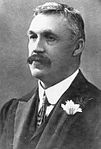South Australian state election, 1918
|
|
|||||||||||||||||||||||||||||||||||||||||||||
|---|---|---|---|---|---|---|---|---|---|---|---|---|---|---|---|---|---|---|---|---|---|---|---|---|---|---|---|---|---|---|---|---|---|---|---|---|---|---|---|---|---|---|---|---|---|
|
|||||||||||||||||||||||||||||||||||||||||||||
|
All 46 seats in the South Australian House of Assembly 24 seats were needed for a majority |
|||||||||||||||||||||||||||||||||||||||||||||
|
|||||||||||||||||||||||||||||||||||||||||||||
|
|||||||||||||||||||||||||||||||||||||||||||||
State elections were held in South Australia on 6 April 1918. All 46 seats in the South Australian House of Assembly were up for election. The incumbent Liberal Union government led by Premier of South Australia Archibald Peake defeated the opposition Australian Labor Party led by Leader of the Opposition Andrew Kirkpatrick. Each district elected multiple members, with voters casting multiple votes.
The Crawford Vaughan Labor government fell in July 1917 due to the Australian Labor Party split of 1916 on conscription, and was replaced by a Peake Liberal minority government. This was replaced by the Peake Liberal-National Labor coalition government in August 1917. Peake initially formed a ministry of liberals, but after complaints from National Labor who had supported him in the confidence motion, he included three National Labor members. Crawford Vaughan, National Labor leader, did not take a place in the ministry. Prior to the 1918 election, three more parties emerged. The Farmers and Settlers Association (F&S), Single Tax (ST) and the Farmers and Producers Country Party (FPCP). The Liberal and National Labor parties went to the election in coalition.
...
Wikipedia



